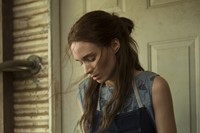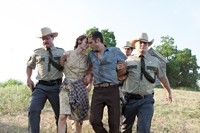After a glowing reception at Cannes and Sundance, we speak to Casey Affleck and Rooney Mara about their latest film, Ain't Them Bodies Saints, and present an exclusive clip
Even the title of David Lowery’s new film, Ain’t Them Bodies Saints, has an elegiac air. It is a rare film, a western more focused on the delicate, green love of its star-crossed protagonists – played by Casey Affleck and Rooney Mara – than shoot-outs and getaways, though they also feature. Terrence Malick’s Days of Heaven, rather than Bonnie and Clyde, seems to be Lowery’s point of reference. Mara and Affleck play blue-collar lovers, Ruth and Bob; when a heist goes awry, Bob is locked up and pregnant Ruth left to raise their daughter alone. Four years later, Bob escapes prison and Ruth is his lodestar – though four years of having to fend for herself have changed her indelibly. Ain’t Them Bodies Saints, which Lowery wrote as well as directed, has the simplicity and haunting power of a folk tale. Ostensibly set in the 1970s, it has a timeless quality, with some scenes that look as though they could have been set in the 1870s. Mara is mesmerising as the enigmatic Ruth, while Affleck’s intense, intractable Bob brings a note of threat into the beautiful, twilit sequences. Showing to rapturous applause both at Cannes and Sundance, Ain’t Them Bodies Saints is released in the UK on the 6th of September. Here, we print an exclusive interview with Mara and Affleck that took place in Cannes.
Casey, how has life been after directing?
Casey Affleck: Life’s good thank you, things are back in order.
How did this project start for you both?
CA: Sometimes movies come together in strange ways but this was pretty straight forward. David sent the script out and everyone immediately responded to it because one of its strengths is the language and I could tell what the film was going to be just from the script. Sometimes it’s not in the script and it’s going to be down to the way the director makes it but with his one you could see that he really loved language and he uses it in a very original way – the dialogue is poetic. So I decided to get involved and we were off and running. And David was fantastic. He was everything I hoped he would be as a director.
Rooney Mara: For me it was the script. I was sent the script and I watched David’s short film, Pioneer and I thought it was really different and kind of odd and interesting and I could tell that David obviously had his own voice and point of view. And then I read the script for Saints and I loved it. It was simple as that.
You’ve both worked on big budget films and smaller, independent films like this. What’s more important for you?
RM: I don’t really think of it in terms of ‘I want to do a big movie’ or ‘I want to do a small movie.’ I think about who is directing, the story, the character I’m going to play. I don’t think about the size of the movie, for me it’s the story and the people who are making it.
CA: I think Rooney’s right. It’s the material and the people you are working with that’s the appeal. It’s not the scale. But if you are doing a smaller movie there is an intimacy that you don’t really have when you are doing much bigger movies. And you have more freedom to change things as you go along, although that didn’t really happen on this. It’s easier to be invested personally in a smaller film. You really get to all spend time together and you are not hanging out in separate trailers. It has more of a summer camp feeling to it and it brings everybody closer and gets everybody on the same page. It’s starts to become one creative endeavour instead of lots of people doing separate jobs.
"I think the more complex, interesting characters tend to be in the darker movies"
Rooney, was this the first time you played a mother?
Yes, it was the first time I’d played a mother and it was a lot of fun. I really enjoyed it. I became very close to the two little girls, twins, who played my daughter.
It’s David’s second feature. Is there an element of trust involved with a director making a movie like this? And when did you know that it was working out?
CA: You never know when you are making it if it’s working out right. I mean, even when the movie is finished, I say to myself, ‘well, if I like it now, how will I feel about it in five years time?’ Because with distance you start to see different things.
Is that because it’s difficult to watch a movie that you are in?
CA: Yes but also it can happen with movies you are not in. You watch them when they first come out and like them and you watch them again later and you think, ‘what did I like about that?’ And it’s even harder when it’s an experience of your own. There’s always a leap of faith with any director. And although David had only made one feature before there was never a question in my mind that he would do a great job. It was the way he talked about movies and the way he talked about his own writing was very encouraging. He had written the script and it was very moving to me. It felt unique and yet it honoured all of the traditions and tropes of the genre and it seemed like he had thought a lot about it and he’d prepared a lot, too. I felt very comfortable with David. Some other director told me that an actor should play for the coach. Just go along and not ask questions and don’t be worried about your own performance – you have to play for the team and that means doing what the coach says. And I have embraced that attitude and it was easy to do that with David because he always had good ideas and I always felt comfortable. Sometimes his ideas were different than mine but I always felt comfortable letting go of my own opinions and doing it as he wished.
And there have been times when you were the coach yourself, when you directed I’m Still Here…
CA: Well, I’ve only done one picture and it was such an unconventional process and it sort of made that philosophy impossible. Many of the people in the movie that I made thought that they were in a documentary so they couldn’t have been playing for me (laughs). I couldn’t have asked them to do things. But as an actor, I’ve found that it’s a liberating approach to working with a director. It just frees you of the responsibility of having to make all of the right decisions and making sure that your character fits in with the way the movie is going to work in general, you just let somebody else take care of that. And I think it serves the director because it gives them lots of choices. And you know, when you are doing a movie, you are making a million decisions a minute and with this shoot it was just 28 days and that can be scary and you want to get it all there and if actors are willing to try it, 10, 15 different ways, and not ask any questions or give you any grief, then it gives you a lot of choices later on to piece the movie together the way you want.
I’m Still Here was a controversial film. Is provocation part of cinema?
CA: Is provocation important to me in the things that I choose? Not really.
But are both of you drawn to darker subjects at times?
RM: I actually don’t think this movie is really dark. This is a love story and I don’t find it dark. I think the more complex, interesting characters tend to be in the darker movies and those are the sort of things that I like sometimes. And people don’t seem to think of me for comedy (laughs). But this film is definitely a love story.
CA: Yes, essentially it’s a tragic love story and it has some hope in the end – there’s hope that Ruth will go on and have a nice life and maybe marry this guy or not. But you can see that she is capable of loving other people and having her daughter wandering around. There’s a feeling of rebirth, I think.
"I loved the dialogue – there was a little bit of improvisation but I don’t think it made anything better"
Casey’s character is desperate to break out – first from his life and then from jail. Have you ever had a feeling of wanting to escape from something?
CA: Being in a bad movie (laughs). I’ve been in several but you know if that’s the worse that can happen in your life you’re in good shape.
Rooney you’ve recently been working with Terrence Malick and Steven Soderbergh. What do you take from those experiences?
RM: I think everything you do you take something from it. You learn what you like and you learn what you don’t like. You learn different things from different directors and different actors. I think every job I’ve had has taught me something and I’ve taken something from it and it’s changed my life in some sort of way. I don’t know how this one changed me, but it did.
How important is costume in a film like this? You were recreating the 1970s…
CA: It can help but it’s not the thing that I rely on. But yes it can definitely help when you get into the clothes.
RM: I think it definitely helps with a period movie. Maybe not with a 70s movie but something earlier the clothes are so different and they change the way you walk, the way you sit, the way you stand. I think for a period movie they are very important.
You were working with a writer/ director here so was there much for you to put your own stamp on in the way things were said or the way scenes were laid out? Was there much flexibility?
CA: There was. David was definitely open to improvisation or changing and re-writing a scene and us giving him some notes but it just didn’t happen that much. I’m not sure why. I’ve experienced way more of that on other movies where the director was much less open to that kind of thing. David is confident enough to allow for other people’s ideas but I think everyone just wanted to make the script. It was one of those unique experiences where everybody is singularly guided by written word. I loved the dialogue. There was a little bit of improvisation but I don’t think it made anything better.
Casey, how did you feel when your brother Ben won the Oscar?
CA: Very proud. I celebrated by going to a party – talking and mingling and socialising and generally having a good time.
What about your own ambitions as a filmmaker? Do you want to direct again?
CA: At this time I’m really enjoying being an actor and there are different projects that I’m thinking about working on so I don’t know (about directing again). I’m Still Here took a big chunk of time and I didn’t get to act and I sort of remembered why I liked acting and I missed it. And now I want to do a little bit more of it.
Ain’t Them Bodies Saints is in UK cinemas September 6.

